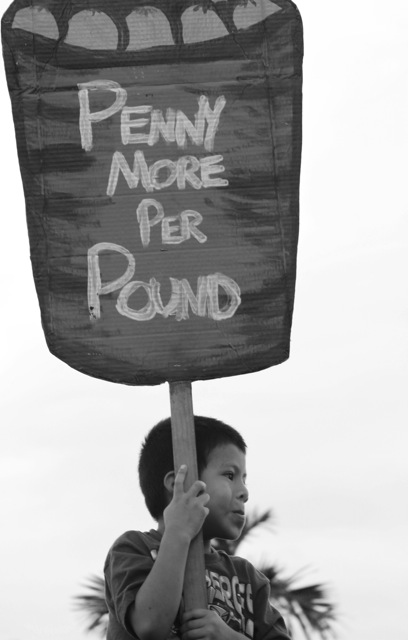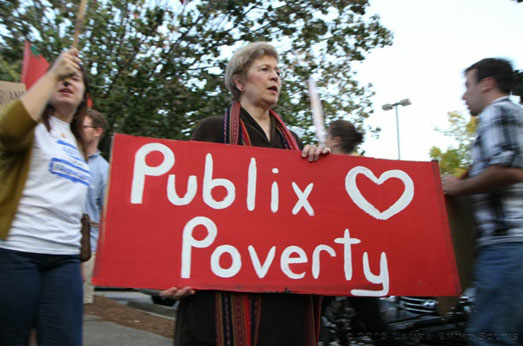[hupso_hide][hupso title=”#NelsonMandela: While #poverty persists, there is no true #freedom” url=”https://ciw-online.org/?p=17513″]
The passing of a hero reminds us of the deep interconnections between poverty and all other human rights, the urgency of our own fight…
Some global events rise so far above the din of our daily lives that, no matter what our work or momentary preoccupation, we have no choice but to stop and reflect on their significance. The passing of Nelson Mandela is one of those events. And its significance has a deep and abiding connection to the fight for fundamental human rights that farmworkers started twenty years ago here in Immokalee.
There are many ways to remember Nelson Mandela. As the father of a nation, a man whose almost unimaginable personal sacrifices forced the world to face the unconscionable violence and evil of South Africa’s social order and allowed the country he loved to build a new nation on the rock of the struggle he came to embody. As a flesh and blood symbol of the very best angels of humanity, of patience, of peace, of the spirit of reconciliation. As a tireless fighter for racial equality and civil rights.
Please take a few moments today to watch the above video of a speech from 2005 by Mandela in London’s Trafalgar Square. It touches on a part of his legacy that is perhaps less known, his undying commitment to ending poverty and economic inequality. Mandela agreed to appear at the Make Poverty History rally in London despite the fact that he had retired from public life a year earlier. As he said at the top of his speech:
As you know, I recently formally announced my retirement from public life and should really not be here. However, as long as poverty, injustice and gross inequality persist in our world, none of us can truly rest.
What he went on to say lifts the fight against poverty to the level of his own fight against apartheid and, reaching even deeper into history, to the movement for the abolition of slavery. It is enormously moving to hear a world leader discuss poverty and economic inequality in such stark and unflinching terms. Here is an extended excerpt:
Massive poverty and obscene inequality are such terrible scourges of our times – times in which the world boasts breathtaking advances in science, technology, industry and wealth accumulation – that they have to rank alongside slavery and apartheid as social evils.
The Global Campaign for Action Against Poverty can take its place as a public movement alongside the movement to abolish slavery and the international solidarity against apartheid.
And I can never thank the people of Britain enough for their support through those days of the struggle against apartheid. Many stood in solidarity with us, just a few yards from this spot.
Through your will and passion, you assisted in consigning that evil system forever to history. But in this new century, millions of people in the world’s poorest countries remain imprisoned, enslaved, and in chains.
They are trapped in the prison of poverty. It is time to set them free.
Like slavery and apartheid, poverty is not natural. It is man-made and it can be overcome and eradicated by the actions of human beings.
And overcoming poverty is not a gesture of charity. It is an act of justice. It is the protection of a fundamental human right, the right to dignity and a decent life.
While poverty persists, there is no true freedom.
“While poverty persists, there is no true freedom.” In those words lies the connection to the movement for Fair Food that prompted us to stop and reflect on the passing of Nelson Mandela in Immokalee, and that will be the topic of tonight’s community meeting at the CIW.
More times than we care to remember, our conversations with food corporations considering joining the Fair Food Program have begun with some variation on this theme: “We’d love to be able to sign on to your social responsibility program, but the penny is the problem.”
 Yet far from being the problem, the Fair Food Premium — the penny-per-pound surcharge required of the corporations to redress the grinding poverty that their volume purchasing power has contributed to creating for farmworkers at the base of their supply chains for decades — is in fact the necessary catalyst for all the other human rights contained in the Fair Food Program (FFP).
Yet far from being the problem, the Fair Food Premium — the penny-per-pound surcharge required of the corporations to redress the grinding poverty that their volume purchasing power has contributed to creating for farmworkers at the base of their supply chains for decades — is in fact the necessary catalyst for all the other human rights contained in the Fair Food Program (FFP).
The FFP is founded on the principle of worker participation. For the FFP to achieve its goals of identifying and eliminating the bad actors and abuses that have plagued the agricultural industry for generations, workers themselves must be willing and able to monitor their own rights under the Fair Food Code of Conduct. But people who are forced, by abject poverty, to choose between risking their jobs to defend their rights, on the one hand, and keeping their jobs to be able to put food on their families’ tables, on the other, will choose food on the table every time. That is the reality — eviction, hunger, deprivation — when sub-poverty wages leave workers with virtually no safety net.
Farm labor poverty must be addressed first, so that workers can be freed from this crippling fear and empowered to stand up for their rights. Together with the FFP’s strict prohibition against retaliation, the Fair Food bonus funded by the penny, which grows with every corporation that joins the Program, affords workers an additional measure of economic freedom to exercise their rights under the Code. Only then can the promise of a new day for farmworkers be realized, because otherwise the resources necessary for real monitoring and enforcement across tens of thousands of acres, and for tens of thousands of workers, would be prohibitive, and the Program would be just another empty assurance of social responsibility.
To their credit, many of those same corporations, through dialogue and careful consideration, come to understand the centrality of the penny per pound to the structure of the Fair Food Program as a whole. Some even embrace the notion that prices can drive poverty and that they have a fundamental responsibility, given their immense market power, to ensure that their purchasing practices do not unintentionally result in human suffering at the bottom of their supply chains.
But others don’t, and so the struggle for fundamental human rights in the fields continues.
It is a struggle in which today echo the words of a man who gave his life to the fight for human rights, of a man whom we now, sadly, must allow to leave us and pass into the firmament of history, to take his place among the great heroes of our time.


